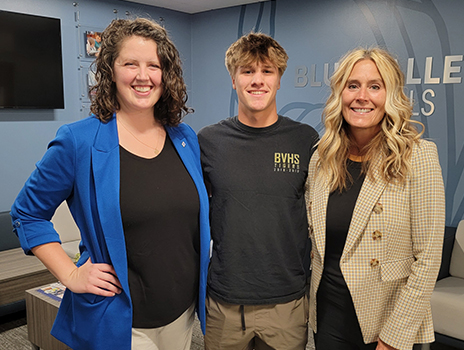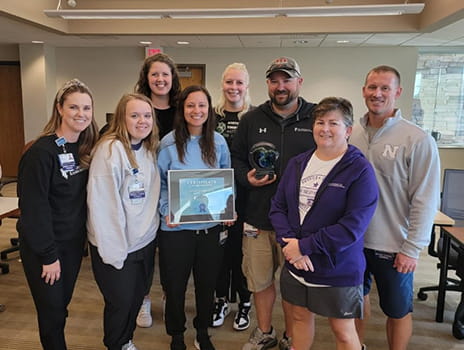January 17, 2024
There’s a lot going on in high school – handling academically demanding classes, learning time management, forming new relationships and working first part-time jobs, to name a few. High school athletes balance even more, from practice schedules to college prospects and managing their mental and physical health. Their team is key to helping them. That includes their coach, teammates and athletic trainer.
That’s part of the reason why The University of Kansas Health System has made it a priority to partner with local high schools and middle schools to provide them with care from our athletic trainers. This program has been in place for 12 years. Doug Wiesner, director of the youth sports medicine program, said he initiated the health system’s first partnership with the DeSoto School District when he realized there was a real need for it.
“I’d been in the community at different high schools, and I knew that the high school community, especially, wasn't receiving the care that they needed,” Wiesner said. “We put the athletic trainer in the schools, and we want them to be part of that fabric of the school. It's so important for them to be embedded and become part of that community.”
Now health system athletic trainers are staffed at 38 schools in the metro area. They work full-time at partner high schools, helping student-athletes prevent injuries, providing support at practice and attending games to give assistance to all teams playing. They are also supported by the health system’s sports medicine physicians and provide continuity of care when a student needs to access services for an injury or concussion at the health system. Additionally, trainers work with physicians to help injured student-athletes return to play.
Matt Ortman:
So, we’ve partnered with KU Health Systems to provide our athletic trainers. We have one at each of our high schools, and then we have three middle school athletic trainers. They spend a lot of hours at the school, they are there at every event, all the practices and home events. These athletic trainers work tremendously hard.
Kelli Kurle:
I think, the relationship building process, it starts with day one and it’s so important, and it’s not only relationships with student athletes, it’s also with our coaches. He has done an amazing job building relationships with kids. Treating them, he knows how certain kids like certain things, like this one wants to be taped this way, or this one, that way. Coaches see kids, you can have a freshman coach, a different sophomore coach, a different JV coach, but you have the same trainer for four years.
Matt Ortman:
I think this is a great recognition for all our athletic trainers. The amount of time, and care, and effort that they put in each and every day, to be recognized as Friends of Education is just a great honor for them.
Trainers honored for the important role they play
The value of these relationships and the care that athletic trainers provide was recognized by the Blue Valley School District in 2023 when it gave the Friends of Education Award to the health system athletic trainers as a whole. This award honors people or organizations in the community who have made outstanding contributions to public education.
The depth of the athletic trainer relationships, and the integration of care with the health system, is maybe best illustrated by a scary incident from September 2023.
It was a Friday night football game at Blue Valley High School. Senior Thomas Hoskins thought he was on the way to his third touchdown of the game when 2 defenders hit him, jamming his elbow and forearm into his own side. He fell to the ground in pain.
Athletic trainer Caitlin Truhe went onto the field and began to assess Thomas.
“I kind of knew, based off his face, that there was something more,” Truhe said. “I took him off to the sideline, and I assessed for rib pain and any other soft tissue pain, and all of that was negative. But clearly, something else was causing him pain, so we needed to really get a further assessment. I called [sports medicine specialist] Dr. Lisa Vopat, who was also on our sidelines, over to assess as well.”
The health system team decided Thomas may have injured his spleen and began to watch for any worsening of his symptoms. When that happened, they immediately activated an emergency plan and called EMS. Thomas was taken to the hospital by ambulance and diagnosed with a lacerated spleen. He was able to avoid surgery and has made a full recovery.
Truhe had been working with and caring for Thomas for more than 3 years. That relationship helped her to know that the injury was more significant than getting the wind knocked out of him. Additionally, she had cared for Thomas’ older siblings as their athletic trainer as well. Which led his mom, Telisa Hoskins, to have a lot of trust in his care.
“I felt like we were in very good hands,” Hoskins said. “I think they're invaluable – both Caitlin and the doctors that we are fortunate to have at our games.”
Outside of attending games, the athletic trainers work with student-athletes 1-on-1 and collaborate with all the other health system athletic trainers to stay prepared. As a group they meet 3 times a year to develop and practice emergency action plans for medical emergencies like cardiac events, heat illness and mental health crises.
“It really, truly is a privilege to work with these kids,” Truhe said. “Working with the athletes and getting to see them play on the field in the sport that they love really is what makes my job so much fun. I hate to tell kids that they can't play. But when they get to return, it's really sweet.”






